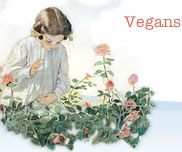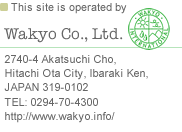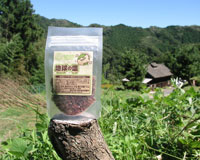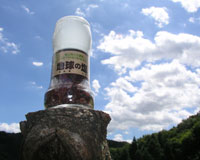|

From ancient times, people all over the world have eaten salt as a food that is indispensable for life.
Our Japanese ancestors also revered salt as a sacred object throughout our long cultural history, and never failed to place salt along with water and rice on the altar to the Gods when making an offering.
Merchant houses and restaurants used to make a little conical "hill" of salt at the entrance to their premises, and today we still see sumo wrestlers "purify" the ring by throwing salt into the ring before fighting. Japanese people today still sprinkle a little salt in their hall after an uninvited guest has returned home, and will also sprinkle salt on themselves when returning from a wake or a funeral.
This was, and still is, done because the positive (yang) energy of salt keeps away the negative (yin) energies.
Our Japanese ancestors produced the sacred salt through an "agricultural" process of concentrating sea water in extensive salt fields. This natural sea salt was consumed for many centuries, but now...
| The main culprit in high blood pressure is common salt made by the ion-exchange membrane process!
In February 1971, the "Salt Industry Modernization Temporary Measure Law" was passed in the Japanese parliament. With this, the traditional salt field "agricultural" production of natural sea salt was totally abolished and salt production and distribution was monopolised by production from large-scale factories mass producing salt by the ion-exchange membrane process.
This refined chemical salt was the cause of high blood pressure and brought on the boom in dietary salt reduction.
What is the "ion-exchange membrane process"?
Electricity is passed through sea water to make the ions move, artificially destroying the natural balance of the mineral composition of sea salt to produce a 99.5% refined sodium chloride, an unnatural chemical salt that is more like a chemical agent than a food.
26 years after it was introduced, the salt monopoly law was abrogated in 1997, finally liberalizing the production and sales of natural salt.
|
This salt is kind to your body and delicious!
Salt recommended for vegan-vegetarians.
|
380-million-year-old sea salt fossil
"Chitama" Salt
|
| Unlike salt that is simply "salty", this is a natural salt with a good flavour. It's so tasty that you can just sprinkle this on rice and eat it as a meal with no main dish!
It also has a redox potential (in other words the potential to keep you young and beautiful and in good health) of minus 340mv, which is extremely high and good for you.
|
|
|
|
|
|












![Vegetarian Recipes [Japanese]](../images/contents01_a.gif)

![Vegetarian Recipes [Chinese]](../images/contents01_b.gif)

![Vegetarian Recipes [European ,etc]](../images/contents01_c.gif)

![Vegetarian Recipes [Sweets]](../images/contents01_d.gif)























![Vegetus Shop [Japanese]](../images/vegetesu_shop.jpg)

![Wakyo Co.,Ltd. [Japanese]](../images/wakyo.jpg)

![Vegetarian Therapy [Japanese]](../images/vegeterian_therapy.jpg)
















